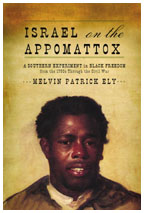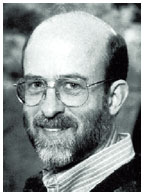November 3, 2004: Reading Room
The freed black slaves of Melvin Patrick Ely ’73 *85’s book named their community Israel Hill, evoking their own “promised land.” (Gene W. King) |
An
experiment in freedom
Melvin Patrick Ely ’73
*85 uncovers Virginia community of ex-slaves
by Maurice Timothy Reidy ’97
Melvin Patrick Ely ’73 *85 was a graduate student in history at Princeton when he first learned about Richard Randolph, a white landowner who freed his slaves when he died in 1796. That act was not unique: George Washington did the same thing. But what intrigued Ely was that Randolph, a cousin of Thomas Jefferson, went one step further, deeding 400 acres of his land to his slaves.
“I made a mental note to look into that if I ever got the chance,” says Ely, a history professor at the College of William and Mary.
Several years later, Ely did. The result is Israel on the Appomattox, a detailed account of the 90 slaves whom Randolph freed and their lives on the property they inherited, a small community in Prince Edward County, Va., that they called Israel Hill. “This was their Promised Land,” Ely writes, “to which they had been delivered out of bondage.” Ely’s book, which took him 10 years to research and write, was published by Knopf in September, and traces their story from the 1790s until the Civil War.
 Ely
felt compelled to pursue the story of Israel Hill after reading Randolph’s
will, which he describes as “the most heartfelt indictment of slavery
I had encountered this side of Frederick Douglass.” He also wanted
to correct the errors that had been propagated by Col. James Madison,
a landowner who lived near Israel Hill and who claimed that the experiment
in black freedom was a failure. Madison’s version of events, Ely
discovered, was nothing more than propaganda used to defend slavery.
Ely
felt compelled to pursue the story of Israel Hill after reading Randolph’s
will, which he describes as “the most heartfelt indictment of slavery
I had encountered this side of Frederick Douglass.” He also wanted
to correct the errors that had been propagated by Col. James Madison,
a landowner who lived near Israel Hill and who claimed that the experiment
in black freedom was a failure. Madison’s version of events, Ely
discovered, was nothing more than propaganda used to defend slavery.
The freed blacks worked closely with their white neighbors on the Appomattox River, and sometimes even married them. The former slaves, who were farmers, carpenters, and cargo boat operators, were also allowed to buy, sell, and bequeath property and take their white neighbors to court. As Ely writes, their rights were substantial, but in a society “predicated on white supremacy and a system of slavery,” freed blacks were not full citizens and had no right to vote.
Ely’s interest in African-American history began when he was a child growing up in Virginia. The Virginia schools were slowly integrated while he was a student, and he saw firsthand his “society wrestle with the many hypocrisies on which it was founded.” At Princeton, he wrote his dissertation on Amos ‘n’ Andy, the radio program that featured white actors speaking “black” stage dialect, and on its TV successor, which had an all-black cast. The dissertation later became a book, and Ely eventually moved to the College of William and Mary, where he helped found the program in black studies.
Ely traveled to Israel Hill to see what had become of it. The memory
of the original settlement had faded even among older black members of
the community. Many descendants of the freed blacks had moved north. There
was no historical marker to tell the story of the slaves freed by Richard
Randolph. Ely hopes that some day, there will be. ![]()
Maurice Timothy Reidy ’97 is an associate editor at Commonweal magazine.
BOOK SHORTS
 Double Vision – George Garrett ’52 *85 (University
of Alabama). In this novel Garrett focuses on two characters: writer Aubrey
Carvey, who resembles Garrett’s late friend Peter Taylor, and another
writer Frank Toomer, who like Garrett suffers from double vision. Garrett
weaves bits of his own life and his friend’s with the story of his
characters in exploring professional rivalries, literary success, and
life and death. Garrett is a professor of creative writing emeritus at
the University of Virginia.
Double Vision – George Garrett ’52 *85 (University
of Alabama). In this novel Garrett focuses on two characters: writer Aubrey
Carvey, who resembles Garrett’s late friend Peter Taylor, and another
writer Frank Toomer, who like Garrett suffers from double vision. Garrett
weaves bits of his own life and his friend’s with the story of his
characters in exploring professional rivalries, literary success, and
life and death. Garrett is a professor of creative writing emeritus at
the University of Virginia.
 From First Kicks to First Steps: Nurturing Your Baby’s Development
from Pregnancy Through the First Year of Life — Alan Greene
’81 (McGraw Hill). In this guidebook, Greene offers parents information
about the early stages of life, including how the fetus develops, what
mothers-to-be should eat, and prenatal testing. He also covers problems
that many new parents face, such as getting baby to sleep better and dealing
with food allergies. Greene is a pediatrician at the Packard Children’s
Hospital at Stanford University.
From First Kicks to First Steps: Nurturing Your Baby’s Development
from Pregnancy Through the First Year of Life — Alan Greene
’81 (McGraw Hill). In this guidebook, Greene offers parents information
about the early stages of life, including how the fetus develops, what
mothers-to-be should eat, and prenatal testing. He also covers problems
that many new parents face, such as getting baby to sleep better and dealing
with food allergies. Greene is a pediatrician at the Packard Children’s
Hospital at Stanford University.
 Masterful Women: Slaveholding Widows from the American Revolution through
the Civil War — Kirsten E. Wood ’91 (University of
North Carolina) Wood looks at Southern slaveholding women who managed
farms and plantations after their husbands died. Slaveholding widows did
work usually associated with white men and crafted a version of mastery
that virtually made them lady patriarchs. Wood is an associate professor
of history at Florida International University.
Masterful Women: Slaveholding Widows from the American Revolution through
the Civil War — Kirsten E. Wood ’91 (University of
North Carolina) Wood looks at Southern slaveholding women who managed
farms and plantations after their husbands died. Slaveholding widows did
work usually associated with white men and crafted a version of mastery
that virtually made them lady patriarchs. Wood is an associate professor
of history at Florida International University.
By Letizia Allais ’05
For a complete list of books received, click here.

